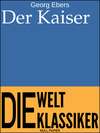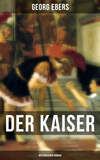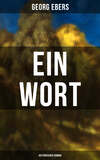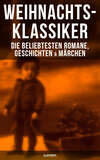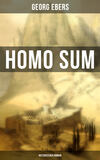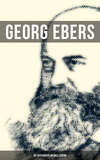Kitabı oku: «Margery (Gred): A Tale Of Old Nuremberg. Complete», sayfa 26
Then thought I, a good end peradventure, by the grace of Christ and the Virgin, but a peaceful end alas! by no means. And this might be seen even in the dead man’s face. In later years, whensoever it has been my lot to gaze on the face of the dead, I have ever perceived that death hath lent them an aspect of peaceful calm so that the saying of common folk, that the Angel of Death hath kissed them is right fitting; but my grand-uncle’s face was as that of a man whose dignity is broken by a mightier than he, and who hath suffered it in silent, gloomy rebellion.
With all our might and soul we prayed for him again and again; howbeit, as must ever befall, other cares came crowding in, to swallow up that one. As soon as the tidings of the old noble’s death were rumored abroad, those who had known him in life came pouring in, and messengers from the town-council, notaries with sealing-wax and seals, priests for the burying, neighbors, and other good folk, and among them many friars and nuns. Lastly came Doctor Holzschuher of the council, my grand-uncle’s notary, and one of our own father’s most trusted friends, in all points a man of such worth and honesty that no words befit him so well as the Cardinal’s saying: that he reminded him of an oak of the German forests.
When, now, this man, who in his youth had been one of the goodliest in all Nuremberg, and who was still of noble aspect with his long silver-grey hair lying on his shoulders—when he now greeted us maids well-nigh gloomily, and with no friendly beck or nod, we knew forthwith that he must have great and well-founded fears for our concerns. Yea, and so it was. Presently, when he had held grave discourse with the High Treasurer and the other chief men of the council, he called to him Cousin Maud and me, and told us that old Im Hoff’s latest dealing was such, to all seeming, as to take from us all hope that our inheritance from him should help us to pay the ransom for Herdegen. And on the morrow his will would be opened and read and we should learn thereby in what way that old man had cared for those who were nearest and dearest to him.
Hereupon we had no choice but to bury many a fair hope in the grave; and notwithstanding this, we might owe no grudge to the departed; for albeit he had cared first and chiefly for the salvation of his own sinful soul, he nevertheless had taken thought to provide for my brothers and likewise for Ann and to keep the pledge he had given. Never in all his days—and this was confessed even by his enemies, of whom he had many—had he broken his word, and it was plain to be seen from all his instructions that the true cause of the deadly blow which had killed him was the sudden certainty that, by his own act, he had bereft himself of the power to redeem Herdegen by paying the ransom as he had promised.
And this was my uncle’s will:
When he had heard from Ann that my lord Cardinal was minded to hasten his home-coming and give him extreme unction, and had likewise had tidings that that high Prelate took great joy in his liberty of dealing with the Papal treasury for alms, he had bidden to him, that very evening, Doctor Holzschuher, his notary, and certain sworn witnesses, and had in all due form cancelled his former will, and in a fine new one had devised his estate as follows:
Ursula Tetzel was to have the five thousand gulden which he had promised her when he had unwittingly killed young Tetzel.
To Kunz he bequeathed the great trade both in Nuremberg and Venice, with all that pertained thereto and certain moneys in capital for carrying it on; likewise his fine dwelling-house, inasmuch as Herdegen would have our house for his own. And Kunz should be held bound to carry on the said trade in the same wise as my grand-uncle had done in his life-time, and pay out of it two-third parts of the profits to Herdegen and Ann; and that these two should wed was the dearest wish of his old age. Not a farthing was to be taken from the moneyed capital for twenty years to come, and this was expressly recorded; nor might the trade be sold, or cease to be carried on. If Kunz should die within that space, then he charged the head clerk of the house to conduct the business under the same pledge. And if and when Kunz should wed, then should he pay only half the profits to his brother instead of two-thirds.
The eldest son of Herdegen and Ann was to fall next heir to the business; but if this marriage came to nought, or they had no male issue, then Herdegen’s son-in-law, or my son, or Kunz’s.
Likewise he believed that he had made good provision for the maintenance of the young pair, inasmuch as though it could scarce be hoped that Herdegen would be able to take the lead of the trading house, yet his own fortune was not so great as to assure to Ann a life so free from burthens, and in all ways so easy as he desired for her, and as beseemed the mistress of so ancient a Nuremberg family.
His landed estates he had for the most part devised to the holy Church, and the remainder in equal halves to Herdegen and to me.
Three thousand gulden, which he had lent to the Convent of Vierzehnheiligen, and of which he might at any time require the repayment, he had set apart to ransom Herdegen and pay for his home-coming.
Of his possessions in hard coin, three thousand gulden were for Herdegen’s share, and one thousand each for Ann and me as a bride-gift, and he had devised goodly sums of money to the hospitals and poor of the city, and the serving-folk and retainers of the household.
But then where was the great and well-nigh royal treasure of which old Im Hoff had, not so long since, been possessed; so that in the time of the Diet he had paid down in hard coin thirty thousand Hungarian ducats to buy himself a Baron’s title? Master Holzschuher could tell us well enough. When that old man had once said to Ann that she could scarce believe how great profit might be gained in a few years by well-directed trading with Venice, he spoke not without book. After endowing many churches and convents in Franconia while he was yet living, with truly lordly generosity, and providing for masses for his soul and other pious offices, he had still a sum of forty and four thousand Hungarian ducats to dispose of. And these moneys, notwithstanding Master Holzschuher’s entreaties that he would devise at least half of these vast possessions to his own town and near of kin, he had bequeathed to the alms-coffers of his Holiness the Pope, to be dealt with at the pleasure of his Eminence Cardinal Bernliardi, with this sole condition: that every year, on his name-day, mass should be said by some high Prelate for his miserable soul, which sorely needed such grace. Moreover he had provided that the document, duly attested by the notary and witnesses, should be sent to Rome on the morrow by a specially appointed messenger; thus it was long since far away and out of reach when my grand-uncle had learnt that all his remaining possessions were not enough to release Herdegen. And this, as I have already said, had fallen heavy on his soul.
Verily there hath been no lack of fervent prayers for his soul on our part; and at a later time, when I came to know to how many hapless wretches his testament had brought a blessing, little by little I forgave this strange bestowal of his wealth, and could pronounce over his grave a clear “Requiescat in pace!” May he rest in peace!
When we had presently duly weighed and reckoned with Master Holzschuher what we had indeed inherited from our rich kinsman, and how much we might ere long hope to collect of our own and from Cousin Maud, we had it before our eyes in plain writing that a large portion of the ransom was yet lacking. The trade of the Im Hoffs’ was to be sure of great money value; but by my grand-uncle’s will we might not touch it for twenty years. Likewise Master Holzschuher pointed out to us by many an example how wrong it would be, and in especial at this very time, to sell landed estate at any price, that is to say at about one-third of its real worth. And finally he told us that the Chancery guardians were not at that present time suffered to pay down one farthing of our inheritance from our father. Thus we were heavy at heart, while Doctor Holzschuher was discoursing in a low voice with Uncle Christian and Master Pernhart, and noting certain matters on paper.
Then those gentlemen rose up; and whereas I looked in the face of the worthy notary meseemed it was as withered grass well bedewed with rain; and glad assurance beamed on me from his goodly and noble features. And I read the same promise in the looks of Uncle Christian and Master Pernhart, and where three such men led the fray methought the victory was certain.
And now we were told what was the matter of their discourse. If they might find a fitting envoy, they might perchance move the Sultan to forego some portion of the ransom; yet would they bear in mind what the whole sum was. Much of our possessions we were indeed not suffered to sell, yet might we borrow on them or pledge them, and the good feeling of our friends and fellow citizens would, for sure, help us to the remainder. Nay, and these gentlemen methought had some privy purpose; yet, inasmuch as they told us nought of their own free will, we were careful to put no questions. As we took leave they besought us yet to delay our departing and to suffer them to be free to do what they would. And we were fain to yield, albeit the blood of the Schoppers boiled at the thought that I must tarry here idle, and others go round as it were with the beggars’ staff, in our name, and for the sake of a son of our house who had done no good to any man. Howbeit, I knew full well that pride and defiance were now out of place; and while I was walking homewards with Ann and Cousin Maud, on a sudden my cousin asked me: If Lorenz Stromer were in Herdegen’s plight would I not gladly give of my estate; and when I said yes, quoth she: “Then all is well.” And inasmuch as she was of the same mind she could, without a qualm, suffer the gentlemen to ask from door to door in Herdegen’s name and in her own. It was our part only to show that we, as his nearest and dearest, were foremost in giving. And on that same day Ann brought all she possessed in gold and jewels, even to her christening coins which she had kept in her money-box, and among them likewise a costly cross of diamonds which my lord Cardinal had given her a few months ago.
That evening, again, as dusk was falling, Ann once more knocked at our door, and the reason of her coming was in truth a sad one: her grand-uncle, old Adam Heyden the organist, our friend of the tower, felt that his last hour was nigh, and bid us go to see him. Thus it came to pass that in two following days we had to stand by a death-bed. On each lay an old man departing to the other world, and meseemed their end had fallen so close together to yield warning and meditation to our young souls. Now, as I toiled up the steep turret-stair, after flying, yesterday, up the matted steps of the wealthy house of the Im Hoffs, meseemed that the two men’s lives had been like to these staircases, and, young as I was, I nevertheless could say to myself that the humbler man’s steep stair, which of late he could not mount without much panting, led up to a higher and brighter home than the wide steps of the rich merchant’s palace.
Howbeit, when I had presently closed that good old man’s eyes, I would not suffer myself to think thus of the twain, by reason that I could not endure to mar my remembrance of that other, to whom, after all, we owed much thanks.
The old organist had received the Holy Sacrament at mid-day from the hand of his old friend Nikolas Laister, the Vicar of Saint Sebald’s. He would have no one to see him save ourselves and Hans Richter the churchwarden, a man after his own heart, and the Pernharts; and at first he marked not our coming, inasmuch as he was just then giving a toy to the deaf-mute boy, which he had carved with his own hand, and Dame Giovanna had much pains to carry away the child, who had cast himself on the old man with passionate love. Everything that moved the little one’s soul he was forced, as it were, to express with unreasoning violence; and now, when the child was so boisterous as to disturb the peace of the others, his mother took him by the hand to lead him away into another chamber; but the dying man signed to him with a look which none may describe, and that moment the little fellow set his teeth hard and stood in silence by the door. Whereupon the old man nodded to him as though the child had done him some kindness.
Then he shut his eyes for a good while, and presently asked for some of the fine Bacharach wine which Cousin Maud had sent him; but his voice could scarce be heard. Ann reached him the glass, and at a sign from him she tasted of it; then he drank it with much comfort while Dame Giovanna held him sitting. The old, sweet smile was on his lips, and as he yet held the stem of the glass with a shaking hand, and suffered that I should help him, he cried in a clear voice: “Once more, Prosit, Elsie! You have waited long enough up there for your old man. And Prosit, likewise, to my dear old home, the fair city of Nuremberg.” Then he took breath and added according to his wont: “Prosit, Adam! Thanks, Heyden!” And emptied the cup which I tilted up for him, to the very bottom. Then, when he fell back and gazed before him in silence, I found speech, and noted, albeit it struck me in truth as somewhat strange, that he bore our good town in mind then, in drinking his old pledge. Hereupon he nodded kindly and added, with an enquiring glance at the churchwarden: “It is rightly the duty of every true Christian man to pray for all mankind! Well, well; but they are so many, so infinitely many; and I, like every other man, have my own little world, inside the great world, as it were, and that is my dear old, staunch town of Nuremberg. Never have I been beyond its precincts, and it contains all on earth that is dear and precious to me. To me the citizens of Nuremberg are all mankind, and our city and so much as the eye can see from this tower all my world, small though it may be. I could ever find some good matter for thought in Nuremberg, something noble and well-compact, a fine whole. I have never sought the boundaries of the other, greater world.”
Yet, that his world was in truth wider than he weened, was plain to us from the prayer he murmured wherein we could hear my brothers’ names, albeit land and seas parted them from him. And after that, for a space all were silent, and he lay gazing at the bone crucifix on the wall; and at last he besought Dame Giovanna to lift him somewhat higher, and he drank again a little more, and said right softly as he cast a loving glance upon us each in turn: “I have looked into my own heart and gazed on Him on the Cross! That is our ensample! And I depart joyfully—and if you would know what maketh death so easy to me; it is that I have needed but little, and kept little for myself; and whereas I was wont to give away what other men save, I came to know of a certainty that all the good we do to others is the best we can do for ourselves. It is that, it is that!”
And he stretched forth his hand, and when we had all kissed it, he cried out: “My God, I now can say I thank Thee! What to-morrow may bring, Thou alone canst know! Margery, Ann, my poor children! May the bright day of meeting dawn for you! May Heaven in mercy protect the youths beyond seas! Here, close at hand is Mistress Kreutzer with her orphan children, you know them—you and Master Peter—they are in sore need of help—and the good we do to others. But come close to me, come all of you—and the little ones likewise.”
And we fell upon our knees by the bed, and he spread forth his hands and said in a clear voice: “The Lord bless you and keep you, the Lord lift up his countenance upon you and be merciful unto you.”
And then he sighed deeply, and his hands fell, and Dame Giovanna closed his eyes.
Yea! Death had come easy to this simple soul. Never knew I any man who gave so much out of a little, and never have I seen a happier or more peaceful face on a death-bed.
My grand-uncle’s burial was grand and magnificent. All the town-council, and many of the nobles joined in the funeral-train. Bells tolling and priests chanting, crape, tapers, incense and the rest of it—we had more than enough of them all. Only one thing was lacking, namely, tears—not those of the hirelings who attended it, but such as fall in silence from a sorrowing eye.
In the Im Hoffs’ great house all was silence till the burying was done; up in the tower, where old Adam Heyden lay asleep, the bells rang out as they did every day, for wedding and christening, for mass and mourning; yet by the low door which led to the narrow turret-stair I saw a crowd of little lads and maids with their mothers; and albeit the leaves were off the trees and the last flowers were frozen to death, many a child had found a green twig or carried a little bunch of everlasting flowers in its little hand to lay on the bier of that kind old friend. It was all the sacristan could do to keep away the multitudes who were fain to look on his face once more; and when he was borne to the grave-yard, not above two hours after my grand-uncle, there was indeed a wondrous great following. The snow was falling fast in the streets, and the fine folks who had attended him to the grave were soon warming themselves at home after the burying of old Im Hoff. But there came behind Adam Heyden’s bier many right honest and respected folk, and a throng, reaching far away, of such as might feel the wind whistling cold through the holes in their sleeves and about their bare heads. And among these was there many a penniless woman who wiped her eyes with her kerchief or her hand, and many a widow’s child, who tightened its little belt as it saw him who had so often given it a meal carried to the grave.
CHAPTER XIV
Our good hope of going forth with good-speed into the wide world to risk all for our lover and brother was not to be yet. We were fain to take patience; and if this seemed hard to us maidens, it was even worse for Kubbeling; the man was wont to wander free whither he would, and during these days of tarrying at the forest-lodge, first he lost his mirthful humor, and then he fell sick of a fever. For two long weeks had he to be abed, he, who, as he himself told, had never to this day needed any healing but such as the leech who medicined his beasts could give him. We awaited the tidings of him with much fear; and at this time we likewise knew not what to think of those gentlemen who heretofore had been such steadfast and faithful friends to us, inasmuch as that Doctor Holzschuher gave no sign, and soon after my grand-uncle’s burying Uncle Christian and Master Pernhart had set forth for Augsburg on some privy matters of the town council. Yet we could do nought but submit, by reason that we knew that every good citizen thinks of the weal of the Commonwealth before all else.
Even our nearest of kin had laid our concerns on the shelf, while day and night alike it weighed on our souls, and we made ready for a long time to come of want and humble cheer. The Virgin be my witness that at that time I was ready and willing to give up many matters which we were forced to forego; howbeit, we found out that it was easier to eat bread without butter and no flesh meat, than to give up certain other matters. As for my jewels, which Cousin Maud would not sell, but pledged them to a goldsmith, I craved them not. Only a heart with a full great ruby which I had ever worn as being my Hans’ first lovetoken, I would indeed have been fain to keep, yet whereas Master Kaden set a high price on the stone I suffered him to break it out, notwithstanding all that Cousin Maud and Ann might say, and kept only the gold case. It was hard likewise to send forth the serving-folk and turn a deaf ear to their lamenting. Most of the men, when they heard how matters stood, would gladly have stayed to serve us for a lesser wage, and each and all went about looking as if the hail had spoilt their harvest; only old Susan held her head higher than ever, by reason that we had chosen her to share our portion during the years of famine. Likewise we were glad to promise the old horse-keeper, who had served our father before us, that we would care for him all his days; he besought me eagerly that I would keep my own Hungarian palfrey, for, to his mind, a damsel of high degree with no saddle nor steed was as a bird that cannot rise on its wings. Howbeit, we found those who were glad to buy the horse, and never shall I forget the hour when for the last time I patted the smooth neck of my Bayard, the gift of my lost lover, and felt his shrewd little head leaning against my own. Uncle Tucher bought him for his daughter Bertha, and it was a comfort to me to think that she was a soft, kind hearted maid, whom I truly loved. All the silver gear likewise, which we had inherited, was pledged for money, and where it lay I knew not; yet of a truth the gifts of God taste better out of a silver spoon than out of a tin one. Cousin Maud, who would have no half measures, carried many matters of small worth to the pawn-broker; yet all this grieved us but lightly, although the sky hung dark over the town, by reason that other events at that time befell which gave us better cheer.
The Magister, as soon as he had tidings of our purpose, came with right good will to offer us his all, and declared his intent to share our simple way of life, and this was no more than we had looked for, albeit we steadfastly purposed only to take from him so much as he might easily make shift to spare. But it was indeed a joyful surprise when, one right dreary day, Heinz Trardorf, Herdegen’s best-beloved companion in his youth, who had long kept far from the house, came to speak with us of Herdegen’s concerns. He had now followed his father, who was dead, as master in his trade, and was already so well thought of that the Council had trusted his skilled hands to build a new great organ for the Church of Saint Laurence. I knew full well, to be sure, that when Herdegen had come back from Paris in all his bravery, he had cared but little for Trardorf’s fellowship; but I had marked, many a time in church, that his eyes were wont to rest full lovingly on me.
And now, when I gave him my hand and asked him what might be his will, at first he could scarce speak, albeit he was a man of substance to whom all folks would lift their hat. At last he made bold to tell me that he had heard tidings of the sum demanded to ransom Herdegen, and that he, inasmuch as that he dwelt in his own house and that his profits maintained him in more than abundance, could have no greater joy than to pay the moneys he had by inheritance to ransom my brother.
And as the good fellow spoke the tears stood in his eyes, and mine likewise were about to flow; and albeit Cousin Maud here broke in and, to hide how deeply her heart was touched, said, well-nigh harshly, that without doubt the day was not far off when he would have a wife and family, and might rue the deed by which he had parted with his estate, never perchance to see it more, I freely and gladly gave him my hand, and said to him that for my part his offering would be dearest to me of any, and that for sure Herdegen would be of the same mind. And a beam as of sunshine overspread his countenance, and while he shook my hand in silence I could see that he hardly refrained himself from betraying more. After this, I came to know from his good mother that this offer of moneys had cost him a great pang, but only for this cause: that he had loved me from his youth up, and his noble soul forbid him to pay court to me when he had in truth done me so great a service.
Still, and in despite of these gleams of light, I must ever remember those three weeks as a full gloomy and sorrowful time.
Kubbeling’s eldest son and his churlish helpmate had fared forth to Venice instead of himself. They might not sail for the land of Egypt, and this chafed Uhlwurm sorely, by reason that he was sure in himself that he, far better than his master or than any man on earth, could do good service there to Ann, on whom his soul was set more than on any other of us.
Towards the end of the third week we rode forth to spend a few days again at the lodge, and there we found Young Kubbeling well nigh healed of his fever, and Eppelein’s tongue ready to wag and to tell us of his many adventures without overmuch asking. Howbeit, save what concerned his own mishaps, he had little to say that we knew not already.
The Saracen pirate who had boarded the galleon from Genoa which was carrying him and his lord to Cyprus, had parted him from Herdegen and Sir Franz, and sold him for a slave in Egypt. There had he gone through many fortunes, till at last, in Alexandria, he had one day met Akusch. At that time my faithful squire’s father was yet in good estate, and he forthwith bought Eppelein, who was then a chattel of the overseer of the market, to the end that the fellow might help his son in the search for Herdegen. This search they had diligently pursued, and had discovered my brother and Sir Franz together in the armory of the Sultan’s Palace, in the fort over against Cairo, whither they had come after they had both worked at the oars in great misery for two years, on board a Saracen galley.
But then Herdegen had made proof, in some jousting among the young Mamelukes, of how well skilled he was with the sword, and thereby he had won such favor that they were fain to deliver sundry letters which he wrote to us, into the care of the Venice consul. Whereas he had no answer he had set it down to our lack of diligence at home, till at last he was put on the right track by Akusch, and it was plainly shown that those letters had never reached us, and that by Ursula’s malice. To follow up these matters Akusch had afterwards betaken himself again to Alexandria; notwithstanding by this time his father had fallen on evil days. And behold, on the very evening after their return, as they were passing along by the side of the Venice Fondaco, whither they had gone to see the leech who attended the Consul—having heard that he was a German by birth—they were aware of a loud outcry hard by, and presently beheld a wounded man, whom they forthwith knew for Kunz.
At first they believed that their eyes deceived them; and that it should have been these two, of all men, who found their master’s brother lying in his blood, I must ever deem a miracle. To be sure, any man from the West who was fain to seek another in the land of Egypt, must first make enquiry here at the Fondaco.
A few hours later Kunz was in bed and well tended in the house of Akusch’s mother, and it was on their return to Cairo, to speak with my eldest brother of these matters, that Eppelein was witness to Ursula’s vile betrayal and the vast demand of the Sultan. Then my brother, by the help of some who showed him favor, had that letter conveyed to Akusch of which Eppelein had been robbed hard by Pillenreuth. More than this the good fellow had not to tell.
As I, on my ride home through the wood, turned over in my mind who might be the wise and trusty friend to whom we could confide our case and our fears, if Kubbeling should leave us in the lurch, verily I found no reply. If indeed Cousin Gotz—that wise and steadfast wayfaring man, rich with a thousand experiences of outlandish life—if he were willing to make common cause with his Little Red-riding-hood, and the companion of his youth! But a terrible oath kept him far away, and where in the wide world might he be found?
Ann likewise had much to cause her heaviness, and I thanked the Saints that I was alone with Eppelein when he told me that his dear lord was sorely changed, albeit having seen him only from afar, he could scarce tell me wherein that change lay.
Thus we rode homewards in silence, through the evening dusk, and as we came in sight of the lights of the town all my doubting and wandering fears vanished on a sudden in wonderment as to who should be the first person we might meet within the gate, inasmuch as Cousin Maud had ever set us the unwise example of considering such a meeting as a sign, or token, or Augury.
Now, as soon as we had left the gate behind us, lo, a lantern was lifted, and we saw, by the light twinkling dimly through the horn, instead of old Hans Heimvogel’s red, sottish face, a sweet and lovely maiden’s; by reason that he had fallen into horrors, imagining that mice were rushing over him, so that his fair granddaughter Maria was doing duty for him. And I greeted her right graciously, inasmuch as Cousin Maud held it to be a good sign when a smiling maid should be the first to meet her as she came into the city gates.
As for Ann, she scarce marked that it was Maria; and when, after we were come home, I spoke of this token of good promise, she asked me how, in these evil days, I could find heart to think of such matters; and she sighed and cried: “Oh, Margery, indeed I am heavy at heart! For three long years have I taken patience and with a right good will. But the end, meseems, is further than ever, and he who should have helped us is disabled or ever he has stirred a finger, and even my lord Cardinal’s home-coming is put off, albeit all men know that Herdegen is as a man in a den of lions—and I, my spirit sinks within me. And even my wise grandmother can give me no better counsel than to ‘wait patiently’ and yet again ‘Wait’…”
Whereupon Susan, who had taken off from us our wet hoods, broke in with: “Aye, Mistress Ann, and that has ever from the days of Adam and Eve, been the best of all counsel. For life all through is but waiting for the end; and even when we have taken the last Sacrament and our eyes are dim in death then most of all must we take Patience, waiting for that we shall find beyond the grave. Here below! By my soul, I myself grew grey waiting in vain for one who long years ago gave me this ring. Others had better luck; yet if the priest had wed us, would that have made an end of Patience? I trow not! It might have been for weal or it might have been for woe. A wife may go to mass every day in the month. But is that an end of Patience? Will the storks bring her a babe or no? Will it be a boy or a maid? And if the little one should come, after the wife has told her beads till her fingers are sore, what will the waiting babe turn out? Such an one as Junker Herdegen grows up to be the delight of every eye and heart, and if that make less need of Patience meseems we know full well! And Mistress Waldstromer, out in the forest, a lady, she, of stern stuff, she could tell a tale; and I say, Mistress Ann, if old Dame Pernhart’s answer sinks into your heart, God’s blessing rest on it!—I am waiting, as you are waiting. We each and all are waiting for one; if by the merciful help of the Saints he ever comes home, yet never dream, Mistress Ann, that Patience will be out of court.”



